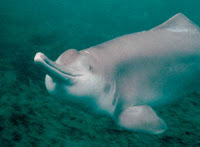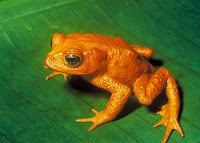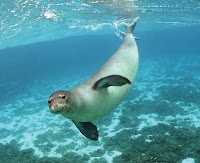An extinct animal species is a species of animal with no living members. Extinct species range from long-departed animals like the dinosaurs to recently extinct animals like Costa Rica's Golden Toad. Extinct species have no natural path to re-existence. An endangered animal species is a species of animal considered to have a high risk of becoming extinct in the near future.
Why are some animals extinct?
Why are some animals extinct?
- Climatic Heating and Cooling-Climate Change is caused by a number of things. The effect that climate has on extinction is very big. The biodiverse Earth can't keep up with the rapid changes in temperature and climate. The species are not used to severe weather conditions and long seasons, or a changing chemical make-up of their surroundings. As more species die, it is only making it more difficult for the survivors to find food. The warmer climates we are used to present-day are perfect for diseases and epidemics to thrive.
- Changes in Sea Levels or Currents-The changes in sea levels and currents is a result, in part, of the melting freshwater. The denser, saltier water sinks and forms the currents that marine life depends on. Ocean floor spreading and rising also affects sea level. A small rise in the ocean floor can displace a lot of water onto land that is all ready occupied. The gases from the volcanic activity can also be absorbed by the water, thus changing the chemical composition, making it unsuitable for some life.
- Asteroids/Cosmic Radiation-Asteroids hit the earth with extreme force. The reverberations can be felt around the world. The impact site is completey destroyed.
- Cosmic Radiation is radiation being emitted from outer space and the Sun. It is hypothesized that being exposed to too much cosmic radiation can mutate genes, which can potentially weaken a species' genepool in the future. Since the radiation comes from space and the Sun, it is extremely difficult to avoid the radiation. Supernova remnants is one source of cosmic radiation.
- Acid Rain-Acid rain forms when sulfur dioxide and/or nitrogen oxides are put out into the atmosphere. The chemicals get absorbed by water droplets in the clouds, and eventually fall to the earth as acid precipitation. Acid rain increases the acidity of the soil which affects plant life. It can also disturb rivers and lakes to a possibly lethal level.
- Disease/Epidemic-Each species has defense mechanisms like immunities and the ability to fight disease. With the changing climate and landscape certain species are losing their ability to fend off disease. They are becoming more susceptible to disease and epidemics, which can lead to their eventual extinction.
- Spread of Invasive Species-Invasive species invade foreign territory. They use resources that the other species depend on. Once competition gets too great, the survival of the fittest plan will begin, and one of the species, usually the natural one, will die off.
- Increased human population
- Destruction/Fragmentation of Habitat
- Pollution
- Climate Change/Global Warming
What can we do?
- Do not buy animal products such as a tiger's claw, elephants tusk etc. Because the animals are cruelly killed for their body parts.
- Try to support organisations such as world wildlife fund as they too strive for the prevention of animal extinction except on a larger scale.
- If you know people who seek pleasure through sports such as hunting, discourage them by explaining the consequences of their actions.
- Do not buy product that are tested on animals. By doing so we can also prevent animal cruelty.
Sources:





No comments:
Post a Comment